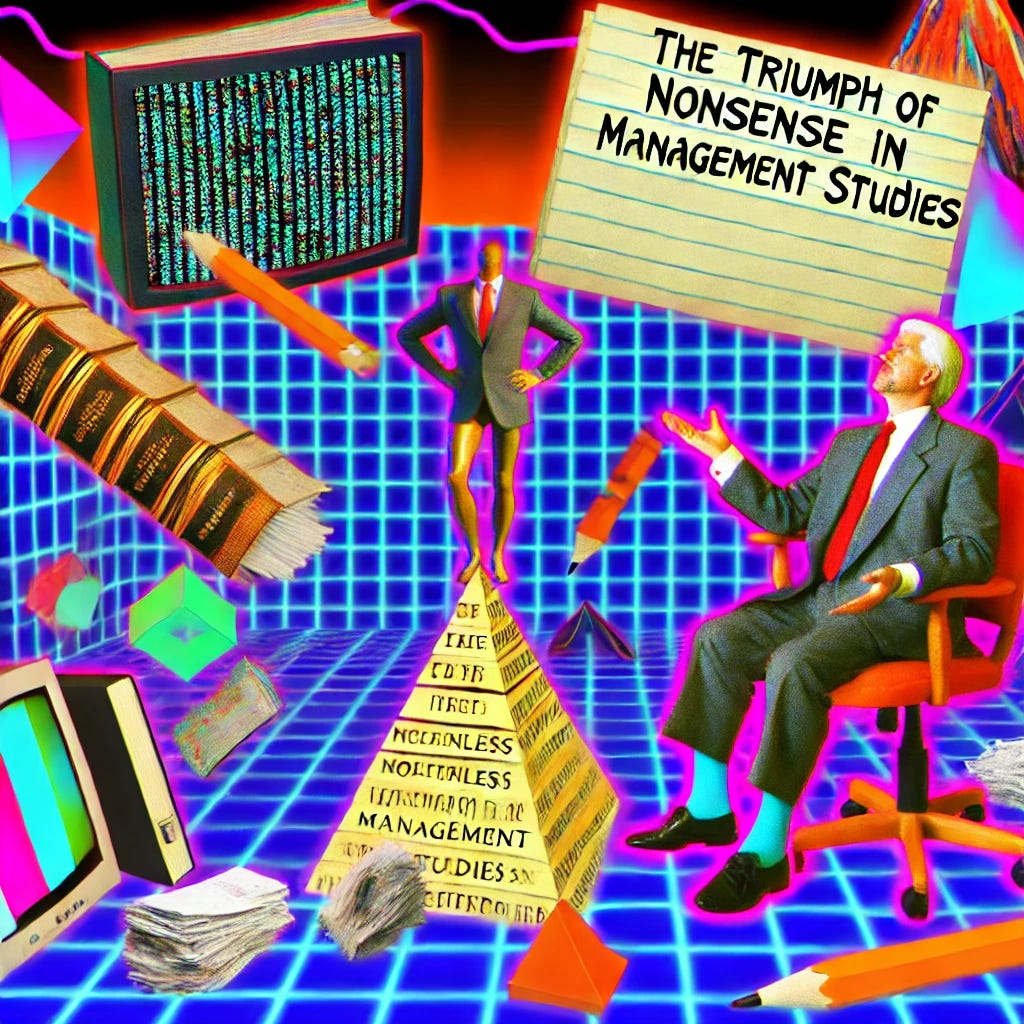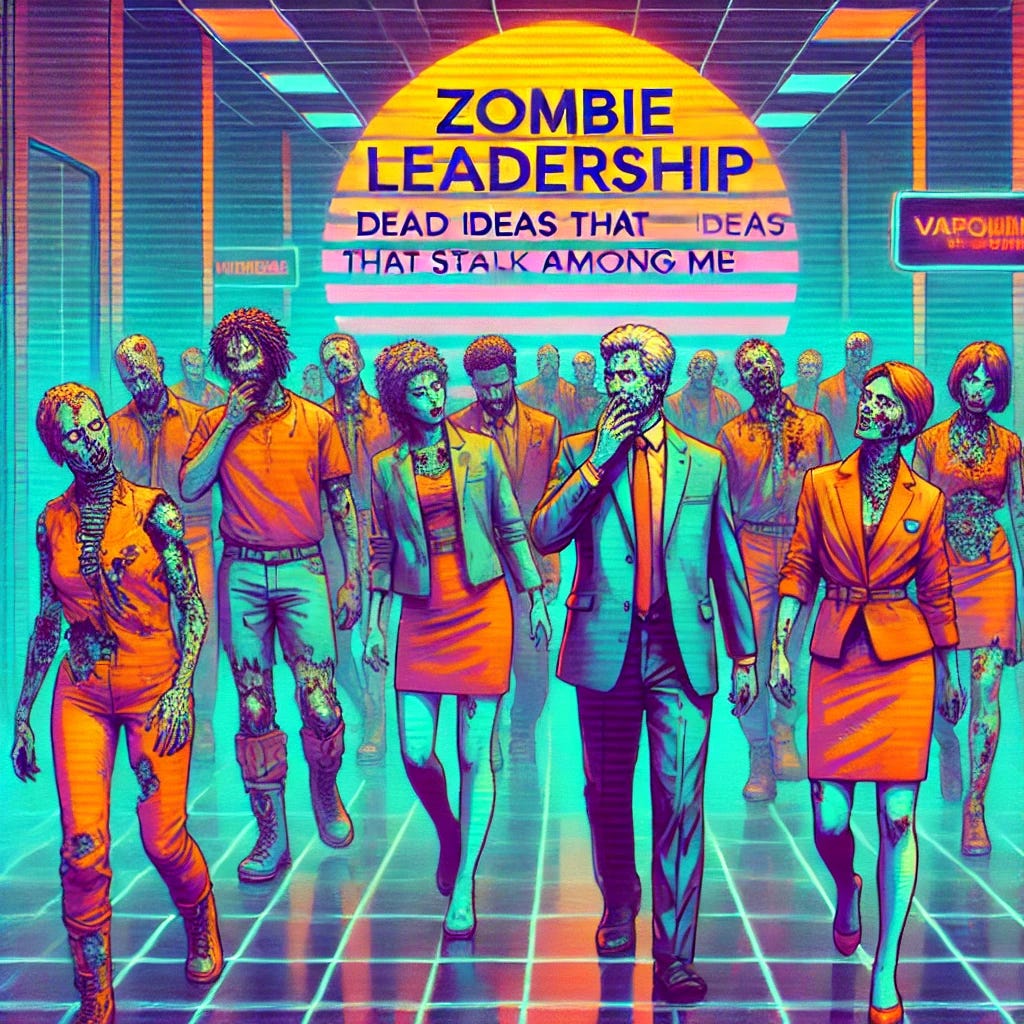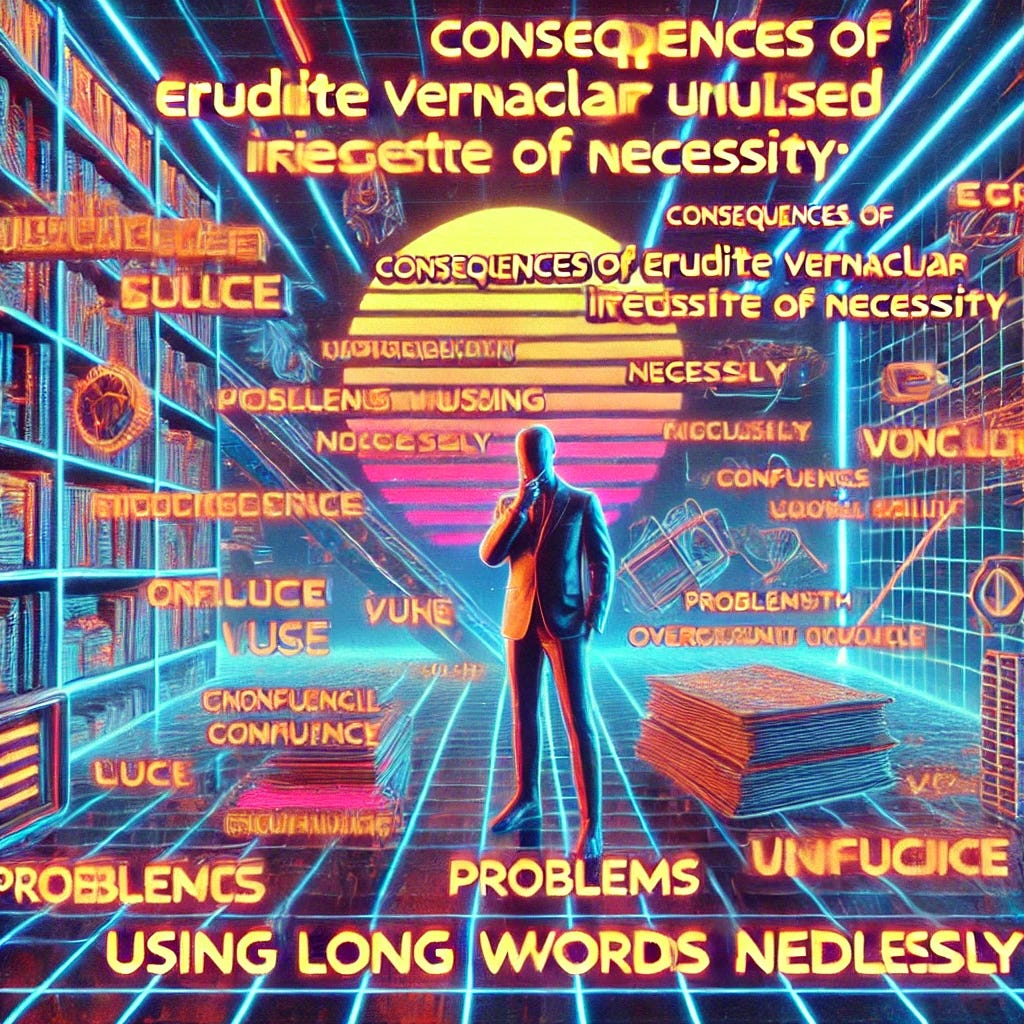Four papers that will make you laugh (then make you think)
Nonsense management theory, zombie ideas, superfluous erudition, and the case of the missing spoons.
Regular listeners to The Mind Tools L&D Podcast will have noticed an ongoing pattern. At around 30-35 minutes into the show, I or one of my co-hosts will use the phrase: ‘Now let’s move on to our regular feature, “What I Learned This Week”’.
This subtle signal that we’re about five minutes away from wrapping up is then undermined by my manager, Owen Ferguson, saying: ‘This week, I wanted to recommend an academic paper published in…’
What follows is a ten-minute exposition on the insights, innovations and inanities of the academic world. Sometimes telling, sometimes trivial, they’ve become part of brand #Ferguson.
And so, as I explore four of my favourite papers in this week’s Dispatch, I dedicate this to The Boss.
The triumph of nonsense in management studies
Published in 2020 by Dennis Tourish, Professor of Leadership and Organization Studies at the University of Sussex, ‘The triumph of nonsense in management studies’ rages against the tendency of theorists to focus on ‘bite-sized chunks of research’ instead of important issues, and on ‘pretentious and long-winded prose to… create the illusion of “theory development”’.
For Tourish, academics have lost a deeper sense of purpose in what they do.
Forget ‘imposter syndrome’, Tourish argues that:
‘…many of us have become “genuine imposters” in that we pretend to be doing more important work, and more competently, than we really are.’
Thanks Gent Ahmetaj for this one!
Application for L&D: Our field is full of genuinely important issues. The productivity paradox, impact of AI on jobs, and need for rapid (and frequent) re-skilling. Are you focusing on any of them?
Zombie leadership: Dead ideas that still walk among us
If the first paper above argues that management theorists are focused too much on triviliaties, this second paper (from Haslam, Alvesson and Reicher, published in 2024) takes it a step further.
The authors use ‘Zombie leadership’ as a catch-all term for:
‘… a set of ideas which have been repeatedly debunked but which nevertheless resolutely refuse to die’.
Among them: a focus on leaders as opposed to followers; the search for a defined set of leadership qualities; an implicit acceptance that leadership is always ‘good’; and the notion that people can’t cope without leaders.
In each case, the authors make a compelling argument that there is plenty of evidence that these ideas should die. And yet they lumber on regardless, rising from the depths of business books and management workshops to gobble up L&D budgets.
This paper is front-of-mind here at Mind Tools Towers as our Content and Insights teams work on an upcoming suite of performance-support resources for leaders, a group that we’re defining as Senior Managers, Managers of managers, and ‘Heads of’. No zombies allowed.
Thanks Carl Akintola-Davis for recommending this one!
Application for L&D: Take a look at your leadership programs. To what extent are they haunted by the zombie ideas outlined above?
Consequences of erudite vernacular utilized irrespective of necessity: problems with using long words needlessly
Ever sat in one of those meetings where you think someone is just talking bullsh*t? Is it the substance of what they’re saying? Or the language they’re using?
For this paper from 2005, Daniel M. Oppenheimer of Princeton University ran a series of experiments to explore the impact of language complexity on judged intelligence.
He found that, while many students admit to using complex vocabulary to try to sound more intelligent, this strategy doesn’t work. Instead, study participants judged that ‘using long words needlessly’ has the opposite effect.
Thanks Matt Furness for this one!
Application for L&D (and business generally): Get to the point. Express ideas simply. Aim for understanding. If you find this difficult, are you sure that you know what you’re trying to say?
The case of the disappearing teaspoons: longitudinal cohort study of the displacement of teaspoons in an Australian research institute
OK, this is kind of a fun one. Published in 2005 by Lim, Hellard and Aitken, this paper examined the common—yet under-researched—phenomenon whereby teaspoons disappear from the workplace.
How worried should we be about this trend?
To find out, the researchers placed 70 discreetly numbered teaspoons around the Burnet Institute in Melbourne, and then tracked them over five months.
During that period, 80% of the teaspoons disappeared.
Per the paper:
‘The half life of teaspoons in communal tearooms (42 days) was significantly shorter than for those in rooms associated with particular research groups (77 days). The rate of loss was not influenced by the teaspoons' value. The incidence of teaspoon loss over the period of observation was 360.62 per 100 teaspoon years. At this rate, an estimated 250 teaspoons would need to be purchased annually to maintain a practical institute-wide population of 70 teaspoons.’
Application for L&D: Bring your own teaspoon to work, and keep it in your pocket.
🎧 On the podcast
Last week on The Mind Tools L&D Podcast, we aired the first of two episodes answering questions that we gathered on LinkedIn. Including:
Will there be more or less opportunity to make a meaningful living in L&D over the next five years? (via JD Dillon)
If we think of L&D as a product, what would you sunset and what would the top three candidates look like for development? (via Sean Brown)
What's more important to a Learning strategy and approach... Speed or Efficacy? (via Marc Steven Ramos)
What's your best ROI story? (via Marc Zao-Sanders)
Check out the episode below. 👇
You can subscribe to the podcast on iTunes, Spotify or the podcast page of our website. Want to share your thoughts? Get in touch @RossDickieMT, @RossGarnerMT or #MindToolsPodcast
📖 Special announcement!
Wha?!?! Normally we do a ‘Deep Dive’ here!
Since we’ve explored the world of academia above, I thought I’d interrupt the usual format to celebrate the success of the Mind Tools Custom team in securing four finalist spots at the Learning Technologies Awards.
My Dispatch friend-and-co-author Ross Dickie is shortlisted with South Western Railway in the ‘Best Use of Blended Learning - Commercial Sector’ category. This management programme resulted in a 12% increase in leadership capability and has had a tangible impact on morale and effectiveness within the company.
Gemma Towersey is shortlisted with Deloitte in the same category for ‘Coaching Skills for Effective Conversations’ - a scalable and innovative blended programme designed for everyone in Deloitte, irrespective of their role or grade.
Claire Gibson is shortlisted with Heathrow for their ‘Right Where I Belong’ diversity programme, in the ‘Excellence in the Design of Learning Content - Commercial Sector’ category. This programme used real employee stories and interactive scenarios to create an engaging, experiential learning course that contributed to increased representation at senior levels and exceeded expectations in employee feedback on workplace culture and inclusivity.
And Claire (again) is shortlisted for ‘Learning Designer of the Year’, based on her innovative and data-driven approach to learning design, coupled with her commitment to measurable impact. The team here already have four Learning Designer of the Year trophies (two gold and two bronze), so no pressure, Claire! 😉
You can find full details on our blog.
And if you’ve got a workplace learning challenge that we can help you with, get in touch! We’d love to chat about how we can help you make a measurable difference to performance, and maybe enter the 2025 awards together! Email custom@mindtools.com or reply to this newsletter from your inbox.
👹 Missing links
⬇️ Pick of the pops: Down one, compliance training!
For the past 9 years, compliance training has been ranked as the top priority of L&D teams in Fosway’s Digital Learning Realities survey, but no longer! For the first time, the No 1 spot has been taken by ‘Upskilling and Reskilling’. Compliance slips down to second place, so is still an ongoing concern, but this shift reflects the anxieties that many organizations feel about the evolving world of work. And those anxieties aren’t going away. To quote David Perring, from Fosway:
‘For all the strategic priority for skills only 17% of L&D teams feel they are very effective at developing people’s skills.’
🗑️ Managers, eh? Who needs ‘em
Investor and co-founder of Y Combinator Paul Graham has been making waves this month with his argument that the traditional approach to running a business (‘management’) is wrong, and that ‘Founder Mode’ is the way forward. In Founder Mode, the boss is involved in all major decisions. Think Elon. The generous interpretation is to say that it worked out well for some of the world’s most successful tech firms. The critical interpretation is to say, well, founders would say that, and two-thirds of start-ups never deliver a positive return for investors.
💡 60 approaches to developing your people
How do you upskill your colleagues? This infographic from RedThread Research catalogues 60 different approaches, split across planning and assessment, discovery, consumption, experimentation, connection and performance support. For Dani Johnson, co-founder and Principal Analyst, the question we should be asking ourselves now is ‘how these methods can be automated or augmented with AI?’, either to less the cost or increase the impact.
👋 And finally…
The Custom team this week got all competitive over the speed of their typing skills. I was pleased to hit 102 words per minute. But with 88% accuracy.
If a frst u dnt sucede, try tri agn.
👍 Thanks!
Thanks for reading The L&D Dispatch from Mind Tools! If you’d like to speak to us, work with us, or make a suggestion, you can email custom@mindtools.com.
Or just hit reply to this email!
Hey here’s a thing! If you’ve reached all the way to the end of this newsletter, then you must really love it!
Why not share that love by hitting the button below, or just forward it to a friend?






